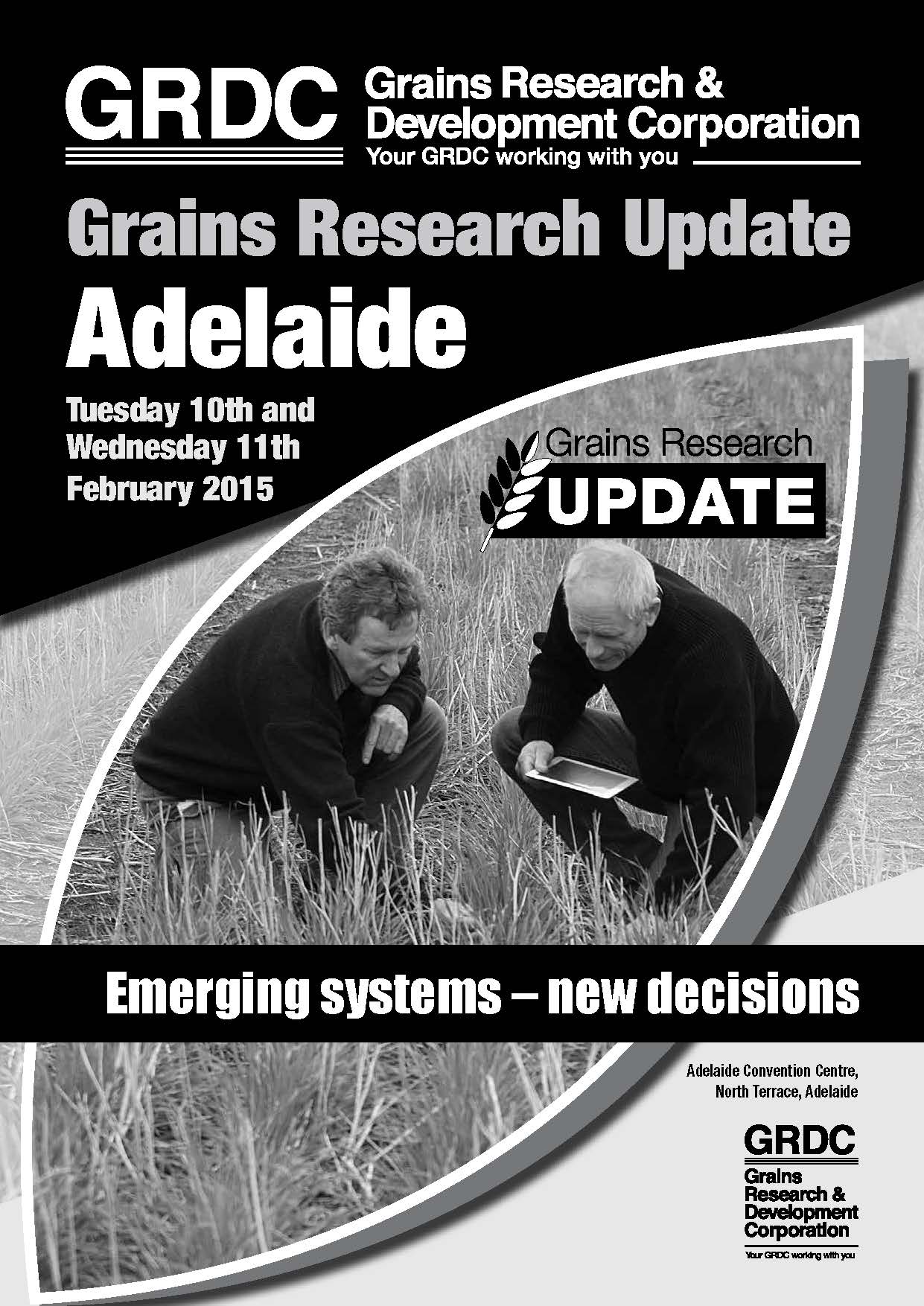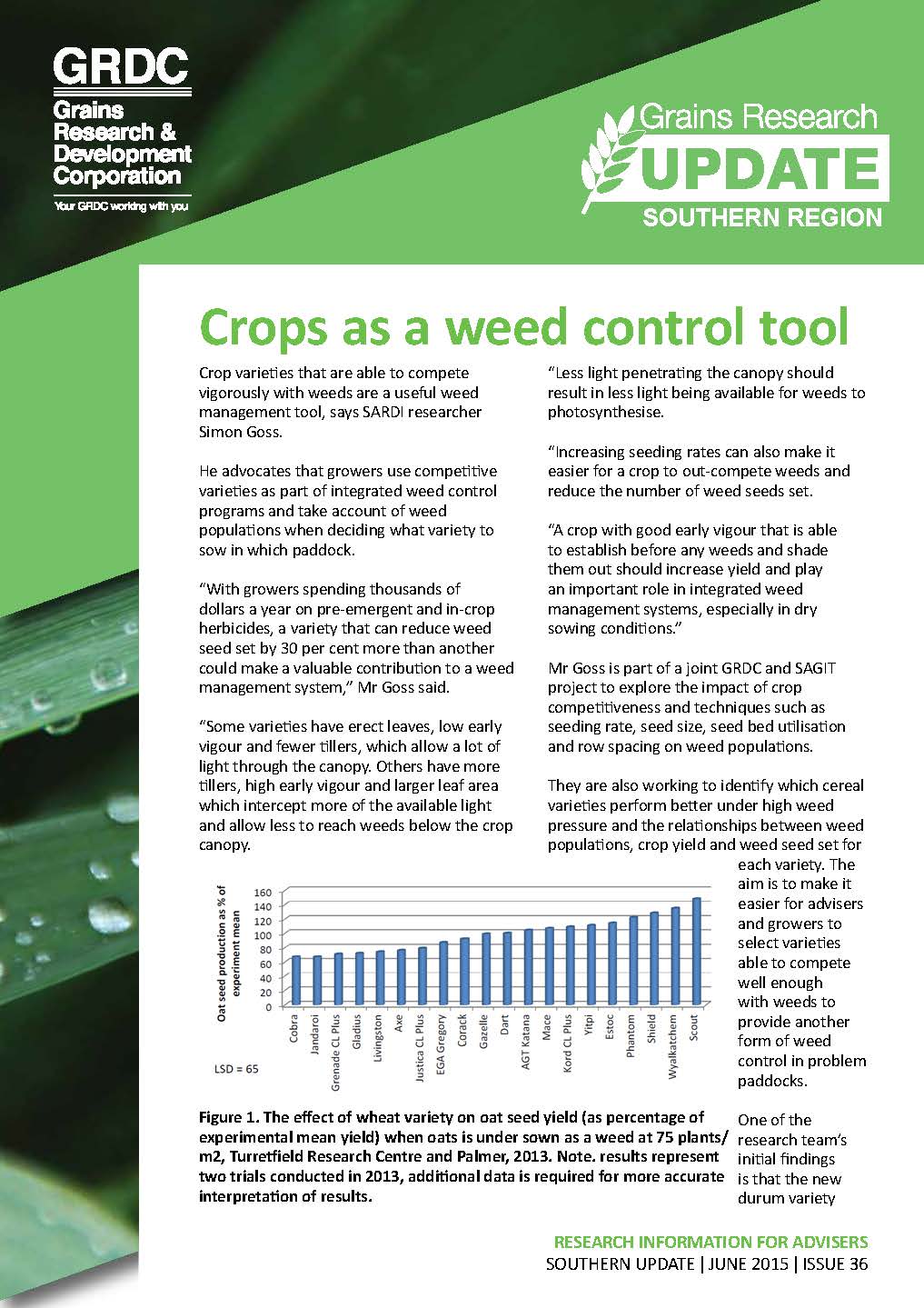GRDC Grains Research Update Adelaide 2015

Adelaide 10th - 11th February 2015
 Adelaide 2015 Proceedings Booklet - PDF 9.6MB
Adelaide 2015 Proceedings Booklet - PDF 9.6MB
Day 1: Theme - Emerging new directions
Innovations underpinning yield improvements in the Canadian canola industry
Malcolm Morrison, Agricultre and AgriFood Canada
The GRDC National Frost Initiative
Tim March, University of Adelaide
Ben Biddulph, Department of Agriculture and Food, Western Australia
Concurrent Session
New technology for improved herbicide use efficiency
Sam Trengove, Trengove Consulting
Pastures for purpose
Tim Prance, T Prance Rural Consulting
Agronomist’s guide to information for managing weather and climate risk
Peter Hayman, SARDI
Where does fertiliser nitrogen finish up?
Peter Grace, Queensland University of Technology
Hitting the right target – what are our most costly weeds?
Rick Llewellyn, CSIRO
Biology and management of summer weeds
Gurjeet Gill, University of Adelaide
Sowing early in 2014 – how did it work?
James Hunt, CSIRO
Wheat variety research update for 2015
Rob Wheeler, SARDI
2015 barley variety update
Jason Eglinton, University of Adelaide
An agricultural consultant’s role in business continuance
Judy Wilkinson, Maro Creek & Wilkinson
Initial findings from launching an unmanned aerial vehicle (UAV) business in agriculture
Martin Peters, FarmingIT
Legume effects on soil N dynamics - comparisons of crop response to legume and fertiliser N
Mark Peoples, CSIRO
Dune discharge seepage areas in the South Australian landscape – what are they, have they changed over time & can we better manage them for improved productivity?
James Hall, Juliet Creek Consulting Pty Ltd
Final Session
From soil throw to bentleg tine seeding research
James Barr, University of South Australia
Regional movement and sources of canola colonisation by diamondback moth, Plutella xylostella, in southern Australia
Kym Perry, University of Adelaide
Science must be asserted – the case for agricultural science
Doug Edmeades, agKnowledge
Day 2: Theme - Emerging systems–new decisions
Concurrent Session
Herbicides for control of clethodim-resistant annual ryegrass
Chris Preston, University of Adelaide
Subsoil manuring - can the successful agronomic and economic impacts be extended to moderate and low rainfall zones?
Peter Sale, La Trobe University
CropPro.com.au – diagnostic agronomy for the southern region
Chris Pittock, Department of Economic Development, Jobs, Transport and Resources
The eXtensionAUS pilot – what it can do for you
Katherine Hollaway, Department of Economic Development, Jobs, Transport and Resources
Backchat session with Doug Edmeades (paper not available)
Doug Edmeades, agKnowlege Ltd
Beet western yellows virus (synonym: Turnip yellows virus) and green peach aphid in canola
Brenda Coutts, DAFWA
Emerging management for net blotch (NFNB) and Septoria tritici blotch (STB) (paper not available)
Nick Poole, Foundation for Arable Research Australia
Biology and management options for control of Septoria tritici blotch and Net form net blotch
Hugh Wallwork, SARDI
Canola growth and development – impact of time of sowing (TOS) and seasonal conditions
Andrew Ware, SARDI
New pulse variety and agronomy update 2015
Larn McMurray, SARDI
Diseases of pulse crops in 2014
Rohan Kimber, SARDI
Using crop competition for weed control in barley and wheat
Simon Goss, SARDI
‘Topping up’ wheat with foliar P – does it work?
Therese McBeath, CSIRO
Final Session
Doing the right thing by growers, markets and industry – it is in your hands
David Fienberg, AEGIC
Moving from an agronomy ‘firefighter’ to a trusted mentor – tips and tools to positively influence your client’s decisions
Carol Fox, Life Performance Pty Ltd
Further Information
Carbon farming and nitrogen fertilizer, opportunity or threat? (paper not available)
Ashley Wallace, Department of Economic Development, Jobs, Transport and Resources
Managing frost risk in warmer seasons may not be as easy as you think
Jack Christopher, University of Queensland
Was this page helpful?
YOUR FEEDBACK

